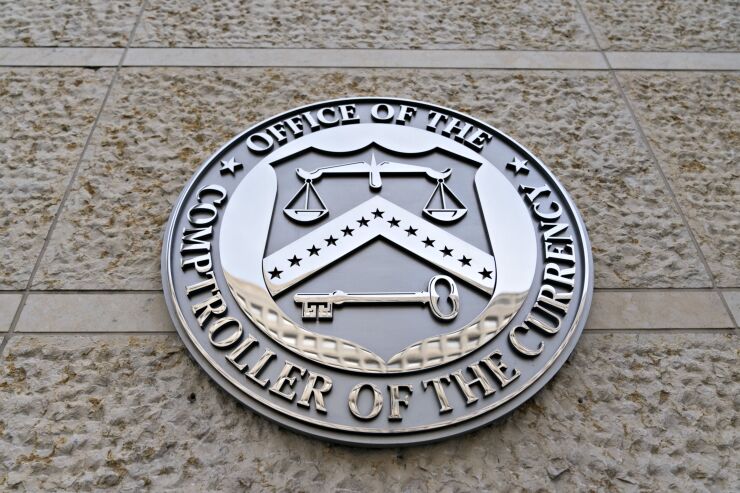WASHINGTON — Several trade groups representing the banking industry appealed directly to Congress in an effort to stop the Office of the Comptroller of the Currency from granting a specialized national bank charter for payments companies that do not take deposits.
In a letter submitted to lawmakers ahead of a House Financial Services Committee hearing, the American Bankers Association called on them to “actively discharge their oversight prerogatives regarding the legality and administrative processes connected to any such charters.”
“As regulators look to promote innovation within banking, they will inevitably come across business models that challenge our current understanding of what constitutes a bank,” the ABA wrote in its letter to the committee's financial technology task force. “In situations where these novel risks are present, Congress should encourage regulators to undertake an open and transparent process, deferring to Congress where appropriate.”
The letter was accompanied by a joint letter to the task force from the ABA, Bank Policy Institute, Independent Community Bankers of America and The Clearing House.
"We oppose any effort by the OCC to offer a payments charter, particularly one that would ultimately grant these companies access to the Federal Reserve payments system — the most critical part of our country’s financial infrastructure — and its corresponding federal safety net without protecting the financial system and consumers from the concomitant increase in systemic risk," the groups said in their joint letter.

The notion of a national bank charter without the requirement of deposit insurance is an idea championed by acting Comptroller Brian Brooks in recent months as one way for fintech payments companies to streamline national money transmitter licensing. But much of the financial services industry, as well as state regulators, have opposed Brooks’s plan. To date, no company has been approved or applied for the charter.
The ABA stressed in its letter that it did not oppose innovation in the banking system but made clear that recent remarks by Brooks, who has suggested banking should be regulated as a series of activities rather than as discrete entities, were a step too far.
“We have serious concerns around the recent discussion of a payments-focused charter being issued by the OCC,” the group wrote.
At an event hosted by LendIt Fintech on Tuesday, Brooks said it might be too late for traditional banks to try to slow the advance of payments-focused firms.
"There are a lot of different kinds of incumbents," he said. "Weirdly, their first reaction is all the same, regardless of the type they are. The reaction is, you know, pull up the drawbridge and fill up the moat: 'We've got to stop this, we cannot allow these challenges to show up.' But [what] I say to them is, it's too late. The challenges are here, and they're big."
He added: "Nobody can look at PayPal and say, 'Jeez, maybe we can put that genie back in the bottle.' They're here because customers want it."
The ABA and other interest groups have called on the OCC to clarify its authority to issue payments charters and other limited-purpose bank charters in “an open and transparent process.”
“Whether you agree or disagree with the thinking behind these charters, the issues being considered have broad and lasting implications for the banking system,” the ABA wrote. “Major policy determinations should be made with robust public input and should not be implemented via the approval of an individual charter.”
The ABA also argued that the OCC appears to be moving ahead on a payments charter even though “the fundamental question of whether existing charters are insufficient to meet the needs of the marketplace has not been analyzed through any formal methodology.”
“The federal government’s increased involvement in the payments marketplace without evidence of a solvable market failure could have unintended consequences,” the ABA wrote.





